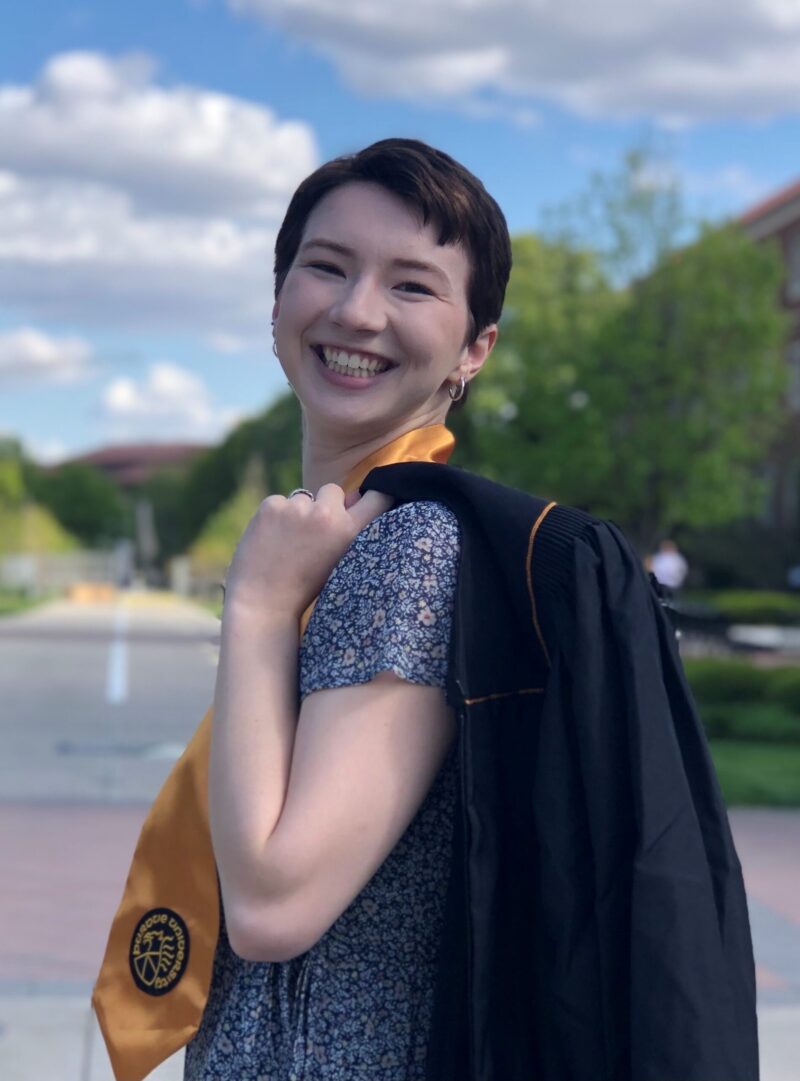Purdue HHS studies find high compliance, favorable opinions of campus COVID-19 measures
Written By: Rebecca Hoffa, rhoffa@purdue.edu
When students began returning to campus in fall 2020, roughly six months into the COVID-19 pandemic, Purdue University put its Protect Purdue protocols in place to keep students, faculty and staff healthy while keeping campus open. Ellen Wells, associate professor in the School of Health Sciences, saw this as a research opportunity that aligned with her occupational and environmental health sciences focus in the College of Health and Human Sciences.

Ellen Wells, associate professor of health sciencesPhoto provided
Wells worked with undergraduate students in her lab to develop studies that investigated the adherence to mask mandates on campus as well as student opinions of Protect Purdue protocols. Aligning with the college’s Sustainable and Thriving Organizations and Communities signature research area, these studies were designed to offer new understanding of protective health measures on a college campus.
“One reason to do both of these studies is to try and figure out what factors correlated with people being more likely to wear masks or people being more likely to follow the guidelines, both of which would ultimately help reduce transmission,” Wells explained.
The two recently published studies — an observational study about mask compliance and an opinion study about COVID-19 protocols at the University — both had positive findings, with over 90% mask compliance and a large number of students who viewed protocols as effective and consequences of not following protocols to be appropriate.
Motivated to mask up
This line of research began with the observational mask study in fall 2020. Wells was aware of literature from past outbreaks and pandemics that had shown adherence to wearing masks isn’t always overly effective because it requires individuals to remember to put on their personal protective equipment and put it on correctly every single time. She noted that these previous studies revealed there was sometimes 50% or less compliance among employees who were guided by workplace health measures.
To see how this played out on a college campus, where mask mandates had not previously been implemented, Wells selected three locations on campus — the Wilmeth Active Learning Center, the Purdue Memorial Union and the France A. Córdova Recreational Sports Center. Then, three undergraduate researchers inconspicuously observed individuals in those locations, keeping a tally of the number of individuals who walked by, how many of them were wearing masks and how many individuals were wearing them correctly. They also collected some basic demographic information based on appearance.

Kenneth BurnellPhoto provided
Then Purdue HHS senior Kenneth Burnell, who is now a graduate student in the occupational and environmental health sciences program at Purdue, led the analysis of the data for the observational study, which marked the beginning of his involvement in research. The results Burnell found were opposite of what the previous literature suggested.
“I was pretty impressed with the high compliance, especially even outdoors,” Burnell said.
The observational study found that there was a higher proportion of females wearing masks than males as well as a higher proportion of students wearing masks than non-students. However, the data showed that there weren’t huge differences and all groups remained above 80%.
“The guidelines worked really well, and people were adhering to them,” Wells noted. “There were a lot of motivations for everyone on campus to wear the masks, and I think being together on campus was a big motivation for everyone.”
Pandemic perceptions
The opinion study followed the observational study in spring 2021. Wells credits Purdue HHS alumna Meredith Robbins, who is now working as a deputy coroner in Illinois, with the idea for this follow-up study. Robbins had previously participated in data collection with the observational study.
“Part of it was me just kind of observing what had been going on prior to the semester starting,” Robbins said. “There wasn’t very much research out there, and I was very curious about it and felt that it would be applicable to the current environment and also the college itself.”

Meredith RobbinsPhoto provided
To gather undergraduate and graduate students’ opinions, Wells and Robbins worked together to develop a survey with a variety of opinion questions related to the COVID-19 guidelines and the consequences for not following them. They posted flyers and emailed the survey to a random sample of students, 643 of whom ended up responding.
The researchers found that females were more likely to think the protocols were effective and were more accepting of the consequences of violating the protocols. Likewise, older students who were either juniors, seniors or graduate students were more likely to agree that the protocols were effective and the consequences were appropriate when compared to first-year students and sophomores.
Students who felt the protocols were effective and that the consequences were appropriate were also more likely to answer that they were concerned about the COVID-19 pandemic. Other trends showed that people who had been infected with COVID-19 themselves were less likely to think the protocols were effective and less likely to agree that the consequences were appropriate.
Wells noted that these results offer valuable information for college campuses regarding communication of health guidelines if strict measures have to be adopted again in the future.
“If you know which groups are more likely to think the guidelines are effective, you also know which groups are less likely to think the guidelines are effective,” Wells explained. “So, in the event that this has to be redone at any point in the future or maybe we go back to more stringent guidelines, we’ll have information about which groups need more outreach or more consideration about how the message is crafted to get it across because we know which groups didn’t really think the measures were effective to begin with or thought the protocols were too strict.”
While Wells noted that these studies are a testament to the Purdue community and will bring value to other college campuses, they also were valuable to her undergraduate students. Both Burnell and Robbins found that their research experience with Wells allowed them to build their critical thinking skills and establish a resume of published works.
“I think it has really changed the outcome of what I ended up doing and how I look at the world around me,” Robbins said.
Discover more from News | College of Health and Human Sciences
Subscribe to get the latest posts sent to your email.